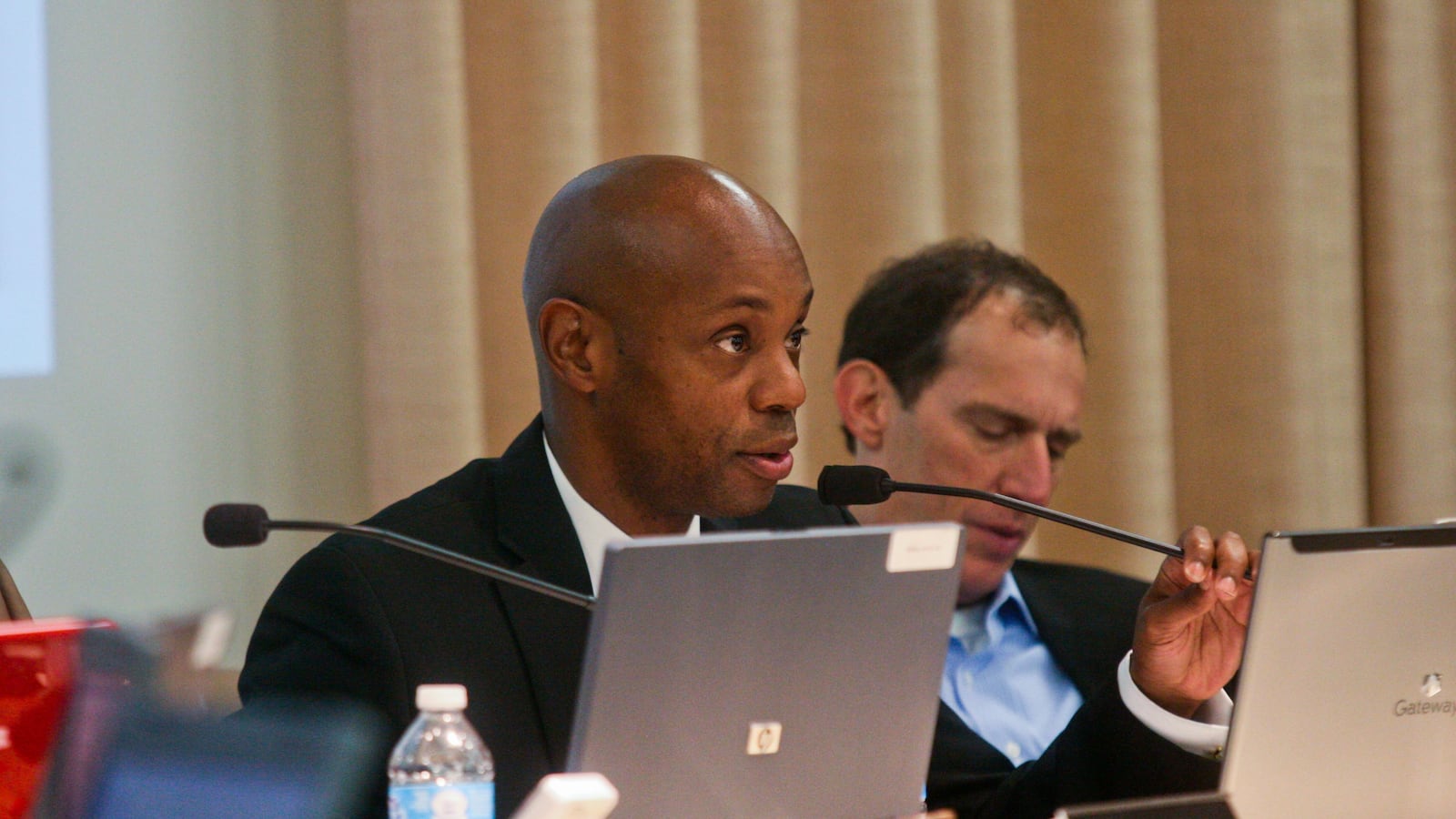He has guided Shelby County School system through a historic year: The merger of legacy Memphis City Schools and suburban Shelby County Schools; a subsequent series of settlements that allowed the creation of six new school systems in the suburbs; a series of dramatic budget cuts and school closings reflecting shrinking enrollment; the continued expansion of the charter school sector and a state-run district. He has set out bold goals to improve graduation rates and academic quality.
But with all that experience, Shelby County schools superintendent Dorsey Hopson II still lacks one thing: A degree in education. Does that matter?
The Shelby County Schools board will consider extending Hopson’s contract Monday, June 23, after hearing public comments.
Experts say that superintendents of large urban school systems need a variety of skills, and that the board’s confidence in a leader is the most important predictor of a district operating smoothly. But community members and local commenters have raised concerns about a school system where the cabinet that is currently devoid of traditional educators, especially in a city that is the center of a number of education reform efforts and home to most of the state’s lowest-ranked schools.
“I can read as many legal briefs as I want to read, but I would not be qualified to be president of the bar association,” said Valerie Griffin, a Memphis resident, at a community meeting in May. “We were told Mr. Hopson was a place marker until they could find someone who was qualified and had worked to redeem inner-city schools.”
Keith Williams, the president of the Memphis-Shelby County Education Association, said he was concerned that the superintendent and his cabinet did not have a grasp of “the process of teaching and learning.” He said that while Shelby County Schools has been dealing with a series of major legal issues, academics should be the focus again.
“I think it speaks to the board not understanding our real purpose. If they think the purpose is to run a business, that’s not the way we perceive the school system,” Williams said. “Our purpose is impacting students and transmitting culture.”
The Commercial Appeal‘s editorial board also voiced concern about the dearth of leaders with education degrees in Hopson’s cabinet earlier this spring.
Roderick Richmond, the district’s most recent chief academic officer, is leaving the position in June. That leaves Shelby County Schools’ top cabinet with just one member with experience teaching. Board member Teresa Jones, who is leading a committee to evaluate the superintendent, said the district should prioritize finding a new CAO.
Hopson, a Memphis native, had been the legal counsel for Memphis City Schools since 2008. He took the reins of the district as interim superintendent in early 2013, after Kriner Cash resigned and in the midst of the school merger. The merged Shelby County Schools board hired him as permanent superintendent in September. His contract is currently to serve until 2016. He currently makes $269,000 a year.
Hopson is technically qualified to be superintendent: In Tennessee, according to state law, though teachers and principals must have specific certifications, the only requirement for a superintendent selected by an elected board of education is a bachelors’ degree.
Having a non-educator superintendent is uncommon, said Dan Domenech, the head of the national School Superintendents’ Association. While there was a spate of non-educators hired to lead big-city districts in the 1990s and early 2000s years—including now-education secretary Arne Duncan, who ran the Chicago district, and former New York City schools chancellor Joel Klein—now, the vast majority of superintendents are educators.
In Tennessee, fewer than five percent of superintendents come from a non-education background, said Wayne Miller, the director of the Tennessee Organization of School Superintendents.
Former Memphis superintendents Kriner Cash and Carol Johnson were both traditional educators. And M-SCEA’s Williams noted that all of the new municipal school districts forming in the suburbs have hired educators to lead their school districts.
But, Domenech said, the most important thing is that board have confidence in Hopson.
Running large urban school systems is a multifaceted job, Miller said. “Public education, particularly in large urban systems, has a lot of intricacies to managing it,” he said. “I was a superintendent, and some days I wished I were an accountant, or a lawyer.”
“The best person to make academic decisions is an educator,” Miller said. “But in a district as large as Shelby County, there are many people with academic expertise.”
Board member Jones said that while she disagrees with Hopson at times, she supports him as superintendent. “For me I see the role of superintendent evolving. There’s great value in having someone with legal expertise. There’s also value in having CAO who has a strong education background,” she said. “We need to find that CAO.”
“For me, it’s difficult to find one person who has both. Even with career educator, you’d need that other component,” Jones said.
And, she said, as the district prepares for a school year in which six new school districts are getting off the ground, “Stability is important.”
At the community meeting aimed at getting comments on Hopson’s performance, most of the dozen speakers were positive. Several commented that the process of the merger and demerger had gone more smoothly than it might have. Veronica Collins, a former member of the Memphis City Schools’ parent assembly, told the board, “Don’t you feel more motivated this year? … Sometimes you have to look outside of the box to bring leadership and rapport to this community.”
The board’s meeting begins on June 23 at 4 p.m. and will be held at the district’s headquarters at 160 S. Hollywood in Memphis.


